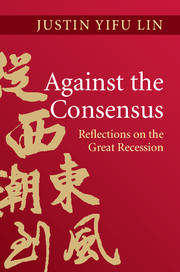Book contents
- Frontmatter
- Contents
- List of figures
- List of tables
- List of boxes
- Preface
- Overview
- Part I What Caused the 2008–9 Global Crisis?
- Part II A Win-Win Path to Recovery
- Part III How Poor Countries Can Catch Up: Flying Geese and Leading Dragons
- 8 The mystery of the great divergence
- 9 The mechanics and benefits of structural change
- 10 Lessons from the failures and successes of structural transformation
- 11 Unique opportunities for poor countries
- Part IV Toward a Brave New World Monetary System
- References
- Index
11 - Unique opportunities for poor countries
from Part III - How Poor Countries Can Catch Up: Flying Geese and Leading Dragons
Published online by Cambridge University Press: 05 June 2013
- Frontmatter
- Contents
- List of figures
- List of tables
- List of boxes
- Preface
- Overview
- Part I What Caused the 2008–9 Global Crisis?
- Part II A Win-Win Path to Recovery
- Part III How Poor Countries Can Catch Up: Flying Geese and Leading Dragons
- 8 The mystery of the great divergence
- 9 The mechanics and benefits of structural change
- 10 Lessons from the failures and successes of structural transformation
- 11 Unique opportunities for poor countries
- Part IV Toward a Brave New World Monetary System
- References
- Index
Summary
As policymakers in poor countries contemplate the challenges facing their countries after decades of misguided strategies, they should respond with optimism rather than despair. Many opportunities lie ahead in an increasingly globalized world.
In the aftermath of the recent global recession, former World Bank president Robert Zoellick described the new economic landscape:
We are now in a new, fast-evolving multipolar world economy – in which some developing countries are emerging as economic powers; others are moving toward becoming additional poles of growth; and some are struggling to attain their potential within this new system – where North and South, East and West, are now points on a compass, not economic destinies. [. . .] We are witnessing a move toward multiple poles of growth as middle classes grow in developing countries, billions of people join the world economy, and new patterns of integration combine regional intensification with global openness.
These words herald the opening of important opportunities for low-income countries in today’s rapidly evolving world economy. During this century a burst of convergence has occurred as developing countries have grown more quickly than high-income countries and emerging market economies have become the new growth poles. In the 1980s and 1990s, except for China, the top five contributors to global growth were the advanced economies of the G7. But from 2000 to 2009, except for the United States, all the top contributors were emerging market economies, and China was the top contributor (Figure 11.1). This trend is being reinforced in the aftermath of the 2007–9 global crisis, with developing countries as a group growing more than twice as rapidly as high-income countries.
- Type
- Chapter
- Information
- Against the ConsensusReflections on the Great Recession, pp. 133 - 144Publisher: Cambridge University PressPrint publication year: 2013



